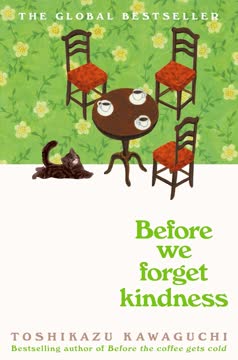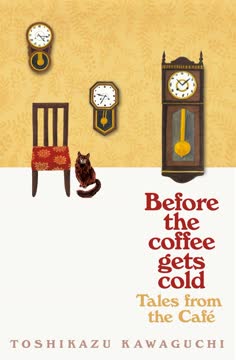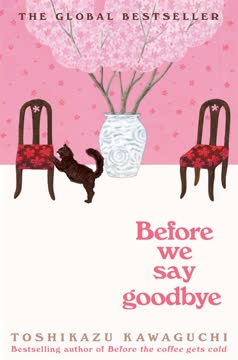Plot Summary
The Time-Travel Café
In a hidden alley of Tokyo's Jimbocho district lies Funiculi Funicula, a café with the unique ability to send its patrons back in time. However, the journey comes with strict rules: the trip lasts only until the coffee gets cold, and nothing done in the past can change the present. The café is run by Nagare Tokita, a stoic man, and his cousin Kazu, the only one who can pour the time-traveling coffee. Despite the limitations, the café attracts those burdened by regrets, seeking closure or a chance to say what was left unsaid.
A Child's Wish
Young Yuki Kiriyama visits the café, hoping to return to a Christmas past when his parents announced their separation. Despite knowing he can't change the outcome, Yuki wishes to replace his tears with a smile, believing his parents' happiness lies in their new lives. His innocent wish highlights the café's bittersweet nature, where the past can be revisited but not altered.
A Mother's Journey
Megumi Sakura, a new mother, visits the café to introduce her baby to her deceased husband, Riuji, and have him name their child. Despite the risk of revealing his fate, Megumi's desire to share this moment with Riuji prevails. In the past, Riuji names their daughter Yu, symbolizing gentleness, and Megumi returns with a sense of peace, having fulfilled her husband's wish.
A Father's Regret
Fumio Mochizuki, estranged from his daughter Yoko after opposing her marriage, visits the café to seek forgiveness. He travels to the future, where he meets Yoko and his grandson. Realizing his mistake, Mochizuki apologizes, and Yoko, burdened by her own regrets, finds solace in their reunion. The encounter underscores the importance of understanding and acceptance in familial relationships.
Unspoken Love
Tsumugi Ito, haunted by her unspoken feelings for her friend Ayame, learns of Ayame's passing and her hidden affection. She visits the café to meet Ayame one last time, receiving a box of chocolates and a confession. Though unable to reciprocate, Tsumugi finds closure, understanding the depth of Ayame's feelings and the value of their shared memories.
The Power of Memory
Each visitor to Funiculi Funicula seeks to reconcile with their past, whether through forgiveness, understanding, or acceptance. The café serves as a conduit for emotional healing, allowing patrons to confront their regrets and cherish the moments that define their lives. Through these journeys, the characters learn that while the past cannot be changed, it can be embraced as part of their personal growth.
Embracing the Present
The stories of the café's visitors illustrate the transformative power of memory and the importance of living in the present. By revisiting their pasts, they gain insights that help them move forward, free from the burdens of regret. The café's magic lies not in altering time but in offering a space for reflection and reconciliation, reminding us that kindness and understanding are timeless gifts.
Characters
Nagare Tokita
Nagare is the towering, quiet owner of Funiculi Funicula. Despite his imposing presence, he is a compassionate figure who provides a space for patrons to confront their pasts. His own loss, the death of his wife Kei, adds depth to his understanding of regret and the importance of cherishing the present.
Kazu Tokita
Kazu, Nagare's cousin, is the only one who can pour the time-traveling coffee. Her calm demeanor and adherence to the café's rules make her a pivotal figure in guiding patrons through their journeys. Her presence is a constant reminder of the café's mysterious power and the limitations of time travel.
Yuki Kiriyama
Yuki is a young boy who visits the café to replace a painful memory with a smile. His story highlights the purity of a child's love and the hope that comes from accepting life's changes, even when they bring sadness.
Megumi Sakura
Megumi, a widow, seeks to connect her deceased husband with their newborn daughter. Her journey underscores the importance of honoring loved ones' wishes and finding peace in the face of loss.
Fumio Mochizuki
Mochizuki, estranged from his daughter, seeks to mend their relationship by traveling to the future. His story illustrates the power of apology and the healing that comes from acknowledging past mistakes.
Yoko Kawashima
Yoko, Mochizuki's daughter, struggles with the consequences of her choices. Her reunion with her father in the future offers her a chance to reconcile her past and embrace her present.
Tsumugi Ito
Tsumugi, haunted by unspoken feelings for her friend Ayame, visits the café to confront her regrets. Her story highlights the importance of expressing emotions and the healing power of shared memories.
Ayame Matsubara
Ayame, Tsumugi's friend, harbors unspoken love for her. Her posthumous confession reveals the depth of her emotions and the impact of unexpressed feelings on relationships.
Plot Devices
Time-Traveling Coffee
The café's coffee allows patrons to travel back in time, but only until the coffee gets cold. This device emphasizes the fleeting nature of time and the importance of making the most of each moment. It serves as a metaphor for the limitations of revisiting the past and the necessity of living in the present.
Immutable Past
A key rule of the café is that nothing done in the past can alter the present. This plot device reinforces the theme that while we cannot change our past actions, we can change our understanding and acceptance of them. It highlights the importance of reconciliation and personal growth.
Emotional Journeys
Each character's journey through time is driven by their emotional struggles and desire for closure. The café serves as a catalyst for introspection, allowing characters to confront their regrets and find peace in their present lives. This device underscores the transformative power of memory and reflection.
Analysis
"Before We Forget Kindness" explores the complexities of human emotions and the impact of unspoken words. Through the lens of time travel, the novel examines themes of regret, forgiveness, and the enduring power of kindness. The café's rules serve as a reminder that while we cannot change the past, we can change our perspective and find peace in the present. The characters' journeys highlight the importance of expressing emotions and cherishing the moments that define our lives. In a world where time is finite, the novel encourages readers to embrace kindness and understanding as timeless gifts that transcend the boundaries of time.
Last updated:
FAQ
Synopsis & Basic Details
What is Before We Forget Kindness about?
- A Time-Travel Cafe: Before We Forget Kindness centers on Funiculi Funicula, a mysterious Tokyo cafe where patrons can travel back in time, but only for the duration it takes for a cup of coffee to cool, and with the strict rule that nothing they do in the past can change the present.
- Four Emotional Journeys: The novel unfolds through four interconnected stories, each focusing on a different individual's desire to revisit a specific moment in their past or future to confront regrets, seek closure, or express unspoken feelings, despite the immutable nature of time.
- Kindness and Acceptance: Ultimately, the book explores the profound impact of human connection, the complexities of regret, and the transformative power of understanding and accepting one's past, emphasizing that true change happens within the heart, not in altering external reality.
Why should I read Before We Forget Kindness?
- Unique Time-Travel Premise: This book offers a fresh, philosophical take on time travel, where the focus isn't on altering history but on emotional reconciliation and personal growth, making it a deeply introspective read. The rule that "nothing you do while in the past will change the present" forces characters and readers to confront the true nature of regret.
- Profound Emotional Depth: Kawaguchi masterfully delves into universal human emotions like love, loss, regret, and forgiveness, presenting poignant stories that resonate long after the final page. Readers will find themselves reflecting on their own relationships and unspoken words.
- Subtle Cultural Insights: Beyond the fantastical premise, the narrative is steeped in Japanese cultural nuances, from family dynamics and social expectations to specific traditions like Valentine's Day, offering a gentle immersion into a different worldview.
What is the background of Before We Forget Kindness?
- Japanese Cultural Context: The stories are deeply rooted in Japanese societal norms, such as the importance of family harmony (Yuki's parents' divorce), the significance of naming a child (Megumi's quest), and the subtle ways emotions are expressed or suppressed, particularly in familial and romantic relationships.
- Urban Legend Setting: The cafe Funiculi Funicula is presented as an urban legend, a place of whispered rumors and strict, almost whimsical rules, grounding the fantastical element within a relatable, everyday Tokyo setting in Jimbocho, a district known for its quiet alleyways.
- Philosophical Exploration of Time: The core background is a philosophical one, exploring the human relationship with time, regret, and the unchangeable past. The cafe's rules, like the limited time and the inability to change the present, serve as a constant reminder of life's inherent limitations and the power of internal transformation.
What are the most memorable quotes in Before We Forget Kindness?
- "Regret comes in two flavours: actions taken and opportunities missed.": This quote, introduced early in the book, succinctly encapsulates the core emotional conflict driving every character's journey, highlighting the dual nature of human remorse and setting the stage for their quests for closure.
- "If you don't go, I think you'll regret it whenever you call your child's name. So, I believe you should go. Go and have your husband name your child. Do it so you can live with pride, knowing that your husband chose the name.": Kohtake's powerful advice to Megumi underscores the book's central theme that confronting difficult truths, even if painful, leads to a more authentic and peaceful present, emphasizing the importance of living without future regret.
- "In life, you bundle up the good and the bad – they're all memories.": Kei's profound statement to Ayame, relayed by Nagare, offers a comforting perspective on life's experiences, suggesting that even painful moments contribute to the richness of one's personal history and are valuable parts of who we become.
What writing style, narrative choices, and literary techniques does Toshikazu Kawaguchi use?
- Simple, Direct Prose: Kawaguchi employs a clear, unadorned writing style, often described as minimalist, which allows the emotional weight of the stories to shine through without complex literary flourishes. This directness makes the profound themes accessible and impactful.
- Episodic, Interconnected Structure: The novel is structured as a collection of four distinct but interconnected novellas, each focusing on a new character's time-travel experience, but with recurring cafe staff and subtle overlaps that build a cohesive world and reinforce overarching themes. This allows for varied emotional explorations within a consistent framework.
- Subtle Foreshadowing and Symbolism: Kawaguchi uses subtle hints and recurring motifs, such as the varying times on the cafe's clocks, the ephemeral nature of steam, and specific objects like the omurice or the Valentine's chocolate, to deepen the narrative's meaning and foreshadow emotional revelations without explicitly stating them.
Hidden Details & Subtle Connections
What are some minor details that add significant meaning?
- The Clocks' Shifting Reality: The detail that only the middle clock shows the correct time in the present, but the left clock becomes accurate in the past (and the middle one stops), subtly reinforces the subjective and fluid nature of time within the cafe's unique rules. It highlights how the cafe itself bends reality to facilitate the emotional journeys, making time a character in itself.
- Nagare's Milk Preparation: Nagare's meticulous preparation of baby formula at a specific, slightly lower temperature (33-34 degrees Celsius) for Megumi's baby, based on his "own theory" from raising Miki, subtly reveals his deep, quiet paternal kindness and his personal experience with infant care following Kei's death. This small detail humanizes the stoic owner and connects him to the theme of parental love.
- The Woman in White's Coffee Consumption: The seemingly absurd detail that the Woman in White cannot refuse coffee offered by Kazu, and drinks it repeatedly until she needs the toilet, is a crucial "rule" that allows others to time travel. It subtly implies a deeper, perhaps involuntary, connection to the cafe's magic, and her "toilet" trips are not just a quirk but a necessary, almost ritualistic, part of the time-travel mechanism.
What are some subtle foreshadowing and callbacks?
- Riuji's "Kidult" Nature and Foresight: Riuji's "childlike way of thinking" and his question, "What would happen if I drank it?" when Megumi is in the past, subtly foreshadow his ultimate act of kindness. His seemingly impulsive decision to drink the coffee for Megumi is a callback to his "kidult" nature, which Megumi later realizes was his way of "constantly protecting" her by avoiding conflict.
- Kei's Past Journey to the Future: Nagare's revelation that his late wife, Kei, traveled to the future to see their daughter Miki as a junior high student subtly foreshadows Mochizuki's journey to the future to see Yoko. This callback establishes a precedent for future travel and reinforces the idea that such journeys, even if they don't change reality, can bring profound peace and acceptance to the traveler.
- Ayame's Unspoken Feelings and Illness: The rumor that Hayato confessed to Ayame and was rejected, coupled with Tsumugi's later discovery of Ayame's illness and her ignored message, subtly foreshadows the depth of Ayame's unexpressed love for Tsumugi. The "sinking feeling" Tsumugi gets when she hears about Hayato's rejection of Ayame is a callback to her own past heartbreak, but the true meaning of Ayame's rejection is only revealed later, adding layers of tragic irony.
What are some unexpected character connections?
- Fumiko's Evolving Empathy: Fumiko Kiyokawa, initially a skeptical and somewhat judgmental cafe regular, becomes a recurring empathetic presence, particularly for Yuki and Megumi. Her own past time-travel experience (to meet Goro) allows her to offer genuine support and understanding, creating an unexpected mentor-like connection with new time-travelers, bridging the gap between the cafe's magic and human emotion.
- Hirai's Blunt Compassion: Yaeko Hirai, the inn owner, appears as a seemingly harsh and blunt critic of Tsumugi's "shallow" jealousy. However, her unexpected intervention and "truth bombs" are revealed to stem from her own deep regret over her relationship with her deceased sister, forging an unexpected connection of shared pain and a desire for Tsumugi to avoid similar remorse.
- Kazu's Cryptic Wisdom: Kazu Tokita, the taciturn waitress, maintains a detached demeanor, but her brief, profound statements ("If you don't believe it happened, then even if what you saw was a dream, wouldn't it still be a part of your life?") and her "I don't have the right to be happy" comment reveal a deeper, almost philosophical, connection to the cafe's magic and the human condition. Her seemingly emotionless responses often carry the most profound insights, connecting her to the core themes of acceptance and the burden of knowledge.
Who are the most significant supporting characters?
- Fumiko Kiyokawa: Beyond being a regular, Fumiko serves as the reader's initial guide to the cafe's rules and emotional landscape, often voicing the audience's skepticism and then evolving into a compassionate, understanding figure. Her presence provides continuity and a relatable emotional anchor across multiple stories, demonstrating the long-term impact of the cafe's magic.
- Kozo Morita (Yuki's Grandfather): Morita is crucial in Yuki's story, not only by telling Yuki about the cafe but also by embodying the quiet suffering of a grandparent witnessing his family's pain. His decision to take Yuki in, driven by his grandson's kindness, highlights the ripple effect of the time-travel experiences on supporting characters and the enduring strength of familial bonds.
- Kayoko Mochizuki (Fumio's Wife): Kayoko acts as a silent counterpoint to her husband's stubbornness, maintaining a secret connection with Yoko and subtly influencing Mochizuki's journey. Her quiet understanding and the revelation of her own actions (like showing Mitsuru's picture to Mochizuki) underscore the hidden strength and sacrifices within family relationships, often unseen by the more outwardly focused characters.
Psychological, Emotional, & Relational Analysis
What are some unspoken motivations of the characters?
- Yuki's Selfless Smile: Yuki's motivation to return to the past is not to prevent his parents' divorce, but to replace his tears with a smile, driven by an unspoken desire to alleviate his parents' guilt and ensure their happiness, even at his own emotional cost. This reveals a profound, almost adult-like empathy in a seven-year-old, prioritizing his parents' peace over his own immediate pain.
- Riuji's Protective Kindness: Riuji's seemingly "childish" actions, like asking if he could drink the coffee or his exaggerated reaction to the idea of his daughter dating, are later understood by Megumi as unspoken acts of kindness and protection. His ultimate decision to drink the coffee himself is an unspoken sacrifice, motivated by his deep love and a desire to spare Megumi the pain of leaving him.
- Tsumugi's Suppressed Jealousy: Tsumugi's avoidance of Ayame and her internal struggle are driven by an unspoken, deeply buried jealousy and insecurity, stemming from past rejections where her crushes preferred Ayame. Her reluctance to confront Ayame is not just shyness but a fear of facing her own "ugly part" that wishes Ayame wasn't around, revealing a complex psychological barrier.
What psychological complexities do the characters exhibit?
- Yoko's Cycle of Self-Blame: Yoko exhibits a complex psychological pattern of self-blame and a need for external validation, particularly from her father. Her repeated failures in relationships and finances lead her to believe she is "paying the price" for defying her father, preventing her from accepting her mother's help until she seeks her father's "forgiveness," even after his death.
- Mochizuki's Hidden Affection and Regret: Mochizuki, a man of few words, struggles with expressing his true feelings, leading to misunderstandings and estrangement from his daughter. His internal monologue reveals a deep, hidden affection and profound regret over his past actions, particularly his realization that his "protection is not everything" and that he "wasn't genuinely looking out for her happiness."
- Ayame's Unrequited Love and Acceptance: Ayame's character embodies the psychological complexity of unrequited love and the quiet acceptance of one's fate. Despite her deep feelings for Tsumugi and her terminal illness, she chooses to express her love and offer comfort in their final moments, demonstrating immense emotional maturity and a desire for Tsumugi's happiness over her own.
What are the major emotional turning points?
- Yuki's Second Cry: The moment Yuki cries again in the past, despite his intention to smile, is a major emotional turning point, demonstrating the overwhelming power of genuine emotion over a forced facade. It highlights that true healing isn't about suppressing feelings but allowing them to surface, even if painful, and that his parents' happiness was not contingent on his stoicism.
- Riuji Drinking the Coffee: Riuji's impulsive act of drinking the coffee meant for Megumi is a pivotal emotional turning point, revealing his profound selflessness and love. This act transforms Megumi's perception of him, shifting her understanding of his "kidult" nature to one of deep, protective kindness, and allowing her to return to the present with a sense of peace and gratitude.
- Mochizuki's Apology and Grandson's Embrace: Mochizuki's heartfelt apology to Yoko and his emotional embrace of his grandson, Mitsuru, marks a significant emotional turning point, as he finally acknowledges his past mistakes and finds joy in the present reality of his family. This moment allows Yoko to release her own self-blame, fostering a sense of reconciliation that transcends death.
How do relationship dynamics evolve?
- Parent-Child Reconciliation: The stories of Yuki, Megumi, and Mochizuki/Yoko all explore the complex evolution of parent-child relationships, moving from conflict or unspoken regret to profound understanding and acceptance. Yuki's selfless love, Megumi's desire for her husband to connect with their child, and Mochizuki's belated apology all highlight the enduring bond and the possibility of emotional healing across generations.
- Friendship Forged and Tested: Tsumugi and Ayame's relationship evolves from a shared passion and deep friendship into one strained by unspoken jealousy and unrequited love. Their final encounter, however, allows for a poignant resolution, transforming Tsumugi's regret into a deeper appreciation for Ayame's enduring affection, demonstrating that true connection can transcend life and death.
- Staff-Customer Empathy: The relationship between the cafe staff (Kazu, Nagare, Kei) and the customers evolves beyond mere service to one of deep, empathetic guidance. The staff, having experienced their own forms of time travel and loss, offer not just rules but profound insights and quiet support, becoming catalysts for the customers' emotional breakthroughs and demonstrating a unique, compassionate dynamic.
Interpretation & Debate
Which parts of the story remain ambiguous or open-ended?
- The Woman in White's True Nature: The exact nature of the Woman in White remains ambiguous; she is described as a "ghost" and a consequence of not finishing the coffee, but her sentience, her constant reading, and her need for the toilet are never fully explained. This ambiguity adds to the cafe's mystique and leaves readers to ponder the deeper implications of eternal waiting.
- Kazu's "Right to be Happy": Kazu's cryptic statement, "I don't have the right to be happy," remains largely unexplained, hinting at a personal tragedy or burden that prevents her from seeking her own happiness or time-traveling. This ambiguity invites readers to speculate on her past and her unique connection to the cafe's rules and its emotional toll.
- The Mechanism of Time Travel: While the rules are clear, the underlying mechanism of how the coffee enables time travel or why it's tied to temperature and the specific chair is never fully detailed. This deliberate ambiguity allows the focus to remain on the emotional journeys rather than the scientific logistics, preserving the magical realism of the premise.
What are some debatable, controversial scenes or moments in Before We Forget Kindness?
- Parents Prioritizing Individual Happiness: The decision of Yuki's parents to divorce for "irreconcilable differences" and their subsequent pursuit of individual happiness with new partners, despite Yuki's distress, could be seen as a debatable moment. It raises questions about parental responsibility versus personal fulfillment and the impact on children, prompting readers to consider different perspectives on modern family dynamics.
- Riuji's Death Revelation: Megumi's decision to bring her newborn to the past, effectively revealing Riuji's impending death to him, is a controversial choice. While motivated by love, it forces Riuji to confront his mortality and the future without him, sparking debate about whether such knowledge, even if it brings a moment of connection, is a cruel burden or a final gift.
- Hirai's Blunt Interventions: Hirai's direct
Synopsis & Basic Details
What is Before We Forget Kindness about?
- A Time-Travel Cafe: Before We Forget Kindness centers on Funiculi Funicula, a mysterious Tokyo cafe where patrons can travel back in time, but only for the duration it takes for a cup of coffee to cool, and with the strict rule that nothing they do in the past can change the present.
- Four Emotional Journeys: The novel unfolds through four interconnected stories, each focusing on a different individual's desire to revisit a specific moment in their past or future to confront regrets, seek closure, or express unspoken feelings, despite the immutable nature of time.
- Kindness and Acceptance: Ultimately, the book explores the profound impact of human connection, the complexities of regret, and the transformative power of understanding and accepting one's past, emphasizing that true change happens within the heart, not in altering external reality.
Why should I read Before We Forget Kindness?
- Unique Time-Travel Premise: This book offers a fresh, philosophical take on time travel, where the focus isn't on altering history but on emotional reconciliation and personal growth, making it a deeply introspective read. The rule that "nothing you do while in the past will change the present" forces characters and readers to confront the true nature of regret.
- Profound Emotional Depth: Kawaguchi masterfully delves into universal human emotions like love, loss, regret, and forgiveness, presenting poignant stories that resonate long after the final page. Readers will find themselves reflecting on their own relationships and unspoken words.
- Subtle Cultural Insights: Beyond the fantastical premise, the narrative is steeped in Japanese cultural nuances, from family dynamics and social expectations to specific traditions like Valentine's Day, offering a gentle immersion into a different worldview.
What is the background of Before We Forget Kindness?
- Japanese Cultural Context: The stories are deeply rooted in Japanese societal norms, such as the importance of family harmony (Yuki's parents' divorce), the significance of naming a child (Megumi's quest), and the subtle ways emotions are expressed or suppressed, particularly in familial and romantic relationships.
- Urban Legend Setting: The cafe Funiculi Funicula is presented as an urban legend, a place of whispered rumors and strict, almost whimsical rules, grounding the fantastical element within a relatable, everyday Tokyo setting in Jimbocho, a district known for its quiet alleyways.
- Philosophical Exploration of Time: The core background is a philosophical one, exploring the human relationship with time, regret, and the unchangeable past. The cafe's rules, like the limited time and the inability to change the present, serve as a constant reminder of life's inherent limitations and the power of internal transformation.
What are the most memorable quotes in Before We Forget Kindness?
- "Regret comes in two flavours: actions taken and opportunities missed.": This quote, introduced early in the book, succinctly encapsulates the core emotional conflict driving every character's journey, highlighting the dual nature of human remorse and setting the stage for their quests for closure.
- "If you don't go, I think you'll regret it whenever you call your child's name. So, I believe you should go. Go and have your husband name your child. Do it so you can live with pride, knowing that your husband chose the name.": Kohtake's powerful advice to Megumi underscores the book's central theme that confronting difficult truths, even if painful, leads to a more authentic and peaceful present, emphasizing the importance of living without future regret.
- "In life, you bundle up the good and the bad – they're all memories.": Kei's profound statement to Ayame, relayed by Nagare, offers a comforting perspective on life's experiences, suggesting that even painful moments contribute to the richness of one's personal history and are valuable parts of who we become.
What writing style, narrative choices, and literary techniques does Toshikazu Kawaguchi use?
- Simple, Direct Prose: Kawaguchi employs a clear, unadorned writing style, often described as minimalist, which allows the emotional weight of the stories to shine through without complex literary flourishes. This directness makes the profound themes accessible and impactful.
- Episodic, Interconnected Structure: The novel is structured as a collection of four distinct but interconnected novellas, each focusing on a new character's time-travel experience, but with recurring cafe staff and subtle overlaps that build a cohesive world and reinforce overarching themes. This allows for varied emotional explorations within a consistent
Review Summary
Before We Forget Kindness continues the popular time-travel café series, offering four emotional stories about regret, love, and family. While some readers found it repetitive and formulaic, others praised its heartwarming tales and exploration of human relationships. The book's emphasis on kindness and closure resonated with many, though some felt the characters were less engaging than in previous installments. Despite mixed reactions, fans of the series appreciated the familiar setting and emotional depth, with several stories bringing readers to tears.
コーヒーが冷めないうちに Series
Download PDF
Download EPUB
.epub digital book format is ideal for reading ebooks on phones, tablets, and e-readers.









